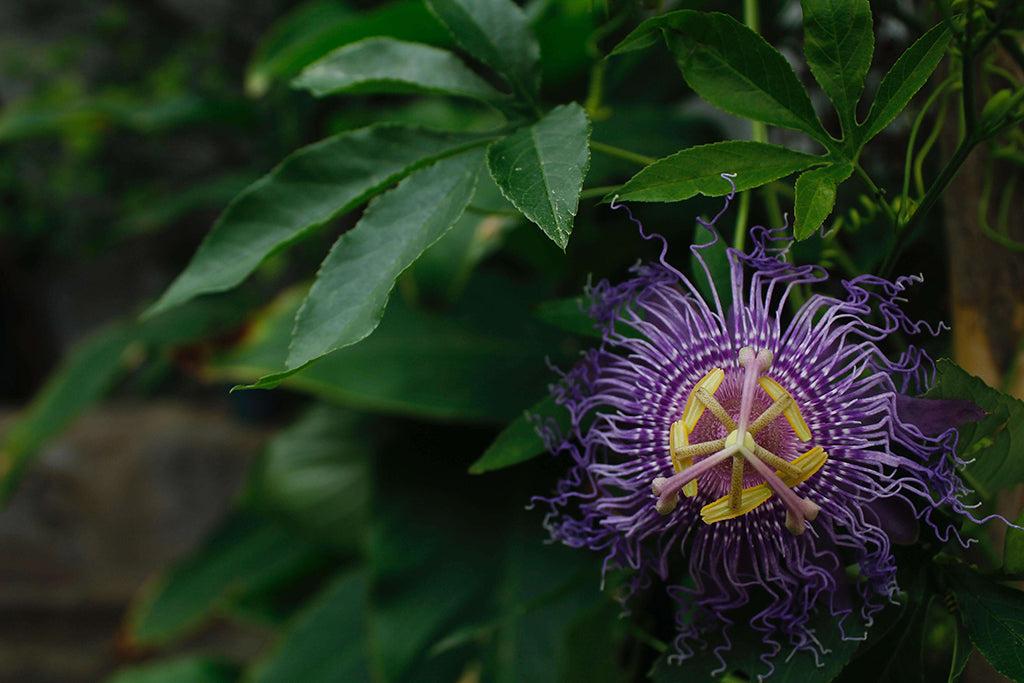Summary: In this blog, we learn all about passionflower for dogs! We’ll find out what passionflower is good for, how it can help your dog, and where to source passionflower from… What Is Passionflower? Passionflower (passiflora incarta) is a vine that can live for several years. It has bright, vibrantly purple flowers and […]
Passionflower For Dogs: What Are The Benefits?

Summary: In this blog, we learn all about passionflower for dogs! We’ll find out what passionflower is good for, how it can help your dog, and where to source passionflower from…
What Is Passionflower?
Passionflower (passiflora incarta) is a vine that can live for several years. It has bright, vibrantly purple flowers and has been touted for centuries in the world of human supplements due to its beneficial properties; namely, its ability to support a calm and relaxed disposition.
What Is Passionflower Good For?
Firstly, passionflower is completely safe to administer to your dog.
Support With Occasional Anxiousness
If your dog experiences things like separation-induced anxiousness, fear of attending the vet, car journeys, or is triggered by the noise emitted by fireworks or thunder, passionflower has been seen to raise levels of gamma-aminobutyric acid (GABA) in the brain. This acid can induce a calm and relaxed state. It can also support healthy levels of serotonin and dopamine in the body which are known as the “happy” hormones. This can then in turn encourage a positive temperament and help boost their overall mood.
So, if you have an occasionally nervous or worried pup, a little bit of passionflower can help them with these feelings and behaviors!

Can Help Cope With Environmental Stressors
Small bouts of stress are healthy to experience by both dogs and humans.
But, by supporting your dog during periods where they experience environmental stressors, you can contribute to promoting their overall health. And, you can do this by introducing passionflower in your dog’s daily routine.
Normal, low-stress levels usually come with a healthy sleep pattern, efficient digestion, and less overall discomfort. This can then mean more positive interactions with your pooch, encouraging normal and regular bodily functions, and can generally support them in having a healthy and happy life with you!
Prevents Destructive Behavior
Dogs facing separation-induced anxiousness (which is more common in younger pups and puppies who haven’t learned their owner comes back yet) can turn to destructive behavior and bad habits. As we good pet parents know, scolding our dogs will only make matters worse and generate fear of us in our fur babies. So, passionflower may be a great route to take in saving your furniture and belongings whilst you go about your day if your dog struggles when you’re gone.
Where To Find Passionflower Extract
You can source passionflower via liquid form which can be added to their food or water, but the amount given should be in accordance with their size and weight. You can also do the same with dried passionflower or passionflower leaves which can be sourced in most health stores.
However, the easiest way to give passionflower to your pooch is through a targeted, specifically made Calming Chew formulated by a respected, reputable pet brand (like us!).
Doggy calming chews aim to work towards a calming effect and can be very beneficial in helping to maintain a normal and relaxed overall disposition. These will also come with clear directions for use and other supportive ingredients in the formula to help out your dog. In general, when purchasing calming supplements, make sure to look for other calming items on the packaging’s ingredient list like ginger root powder, magnesium citrate, L-Tryptophan, or lemon balm powder.
As with any supplements, always consult with your vet first before you introduce passionflower to your pup, particularly if your dog takes regular prescribed medication for a long-term condition.
Passionflower should not be given to pregnant or lactating dogs.
Sources
Author Lich, Emily “The Benefits Of Passionflower For Dogs” The Pet Gourmet, Jun 11. 2020 https://www.thepetgourmet.com/blogs/pet-owners-tips-and-tricks/the-benefits-of-passionflower-for-dogs
“Passionflower For Dogs As A Natural And Safe Calming Aid” Accurate Clinic http://accurateclinic.com/wp-content/uploads/2017/05/Passionflower-for-Dogs-as-a-Natural-and-Safe-Calming-Aid.pdf
 S
S



